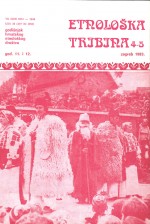Godišnji (jesenski) običaji i životni običaji na Silbi
Calendar (fall) customs and life-cycle customs on Silba
Author(s): Lidija NikočevićSubject(s): Christian Theology and Religion, Customs / Folklore, Ethnohistory, Recent History (1900 till today), Cultural Anthropology / Ethnology
Published by: Hrvatsko etnološko društvo
Keywords: calendar (fall) customs; life-cycle customs; Silba; All Saints Day; Day of Souls; child’s umbilical cord; marriage; funeral;
Summary/Abstract: Fall was a quiet period without much activity (grape-picking used to take place in late summer), so people often gathered for dances, playing of »tombola« (especially women) and to watch performances of the loca actors’ society. After electricity was introduced in 1970 and TV moved into peoples' homes, the style of socializing and communication changed significantly. Two major holidays of the period are All Saints Day (November 1st) and the Day of Souls (November 2nd). Traditionally, a special sort of meal was cooked on the first day and distributed to the village poor and to the children. Nowadays, it is replaced by sweets. The life-cycle customs included the careful preservation of a child’s umbilical cord; a symbolic negotiation for a prospective bride by the groom’s mother (since the couple themselves actually arranged their marriage); bride’s trousseau and sometimes dowry; wedding parties even a week long and taking place in either the bride’s or groom’s house, or in a third location; visiting and watching the body of a deceased person overnight; and throwing ashes after the funeral party so that the spirit of the deceased would not return home.
Journal: Etnološka tribina : Godišnjak Hrvatskog etnološkog društva
- Issue Year: 11/1983
- Issue No: 4-5
- Page Range: 17-20
- Page Count: 4
- Language: Croatian

